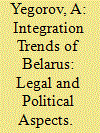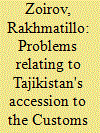|
|
|
Sort Order |
|
|
|
Items / Page
|
|
|
|
|
|
|
| Srl | Item |
| 1 |
ID:
135065


|
|
|
|
|
| Summary/Abstract |
Is the harmonization of financial regulatory regimes possible in East Asia? Focusing on corporate governance, which many see as a critical part of the 1997 Asian financial crisis, and which is also seen as unresponsive to calls for change, this paper argues that such harmonization is possible, but that it will not be according to the standards advocated by the International Monetary Fund, World Bank, Organisation for Economic Co-operation and Development, and other international organizations. At present, actors generally feign compliance with these international rules and standards. The pattern of noncompliance is reflective of two types of regulatory models at work in East Asia, which correspond to democratic and nondemocratic regimes. The manner by which these political institutions mediate the influence of key actors determines corporate governance outcomes. Three cases illustrate the key dynamics: Singapore (nondemocracy), South Korea (democracy), and pre- and post-World War II Japan (change from nondemocracy to democracy). By identifying the key actors that determine regulatory outcomes, this paper points to a more realistic regulatory framework. This alternative framework is a compromise between the standards advocated by international organizations and the domestic political realities of East Asia.
|
|
|
|
|
|
|
|
|
|
|
|
|
|
|
|
| 2 |
ID:
079071


|
|
|
|
|
| Publication |
2007.
|
| Summary/Abstract |
When initial automobile environmental standards were introduced during the 1970s and 1980s there was a large difference in the level and timing of the introduction of these initial emission standards in the United States, Japan and Europe. Trade in automobiles was the target of fierce trade disputes in the 1980s between, for example, the United States and Japan. The governments of Japan, the United States and Europe were involved in trade negotiations as agents of the automobile industry of each country, often focusing on environmental standards as sources of non-tariff barriers. But since the mid-1990s, because of the globalization of the automobile industry, automobile firms have had common interests in collaborating in relation to voluntary harmonized standards. They also have common interests in relation to other sectors such as the petroleum industry in that the burden for emission reductions needs to be shared equitably among sectors. In that sense, it can be said that a 'depoliticizing strategy' has been used, which is the strategy used by the automobile industry not to rely on government intervention and trade conflicts at an intergovernmental level to deal with the difference in standards. There is a tendency for high-level convergence concerning environmental emission standards for NOx etc. in Japan, the United States and Europe and related sulfur content standards for complying with them. In addition, the automobile industry has been consciously seeking international harmonization through the Trans Atlantic Business Dialogue (TABD) and the TrilateralWorking Group. Harmonization has also been attempted at the intergovernmental level to gain legitimacy at the arena of the United Nations Economic Commission for Europe (UNECE) through the signing of the 1995 Agreement (the revision of 1958 Agreement) and the establishment of the 1998 Global Agreement. In the process, governments have been requested by automobile firms to adopt harmonized standards; but governments also have their own incentives to set up an intergovernmental mechanism to establish harmonized standards.
|
|
|
|
|
|
|
|
|
|
|
|
|
|
|
|
| 3 |
ID:
163634


|
|
|
| 4 |
ID:
064552


|
|
|
| 5 |
ID:
127624


|
|
|
|
|
| Publication |
2013.
|
| Summary/Abstract |
This article attempts to analyze the organizational, political, economic, and legal problems associated with the Tajikistan's accession to the Customs Union, the establishment of which is objectively important with respect to its aims, functions, and potential for achieving the projected results. In so doing, it focuses mainly on the Custom Union's regulatory and legal framework.
The article presents the results of an analysis of the prerequisites, consistent patterns, and consequences of Tajikistan's accession to the Customs Union; they have been expressed in some of the theoretical conclusions and practical proposals.
|
|
|
|
|
|
|
|
|
|
|
|
|
|
|
|
|
|
|
|
|